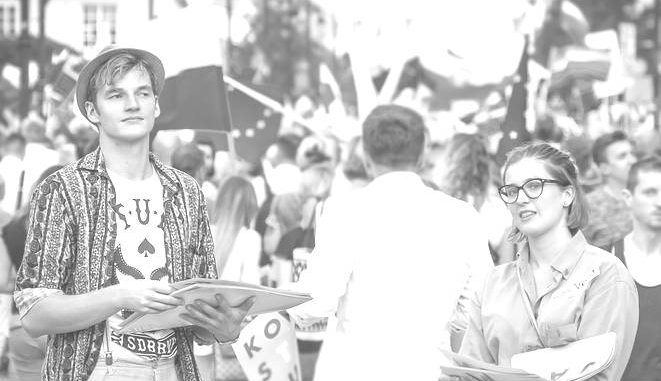
Ignasi Bernat and David Whyte argue that Catalonia’s independence movement is driven by solidarity – and resistance to far-right Spanish nationalists
Ignasi Bernat is an academic sociologist and social movement activist based in Barcelona
David Whyte, is Professor of Socio-legal Studies at theUniversity of Liverpool and one of BRAVE NEW EUROPE’S regular authors. He wrote this article from Barcelona.
Cross posted from Red Pepper
Not content with the public shows of violence that shocked the world, the Spanish government is now using totalitarian powers to jail the Catalan government en masse and suspend parliament, with the same 10,000 paramilitary police standing guard who dragged women out of polling stations by their hair.
It is the arcane offence of sedition that two civil society leaders, Jordi Sánchez and Jordi Cuixart, have been imprisoned for. The attorney general has also explicitly accused left wing members of the Catalonian parliament of ‘rebellion’. Some activists who resisted the police violence and defended themselves are now being charged with ‘hate crimes’ against the police.
The arbitrary imposition of this exceptional ‘legal’ response reflects the despotic nature of the ruling conservative party PP’s determination to maintain obedience to the Spanish state in its province of Catalonia at all costs. It also reflects the nervousness about the prospect that self-determination opens up new space for a genuinely different society. This, after all is a state that is born out of a unique moment of civil disobedience and that means something very significant indeed.
Power on the streets
Yes, the struggle for independence mobilised Catalonian nationalism, and yes, the decision to move to the referendum was only achieved with the support and leadership of the political and business elites in Catalonia. But this rebellion is by no means a narrow nationalist or apolitical struggle.
Indeed, the Catalonia movement is increasingly characterised by a popular mobilisation againstnationalism: the explicitly nationalist authoritiarianism of the Spanish state.
In the last decade or so, the resistance to Madrid’s authoritarian nationalism has gathered momentum. Since the PP lost the election in 2004, its strategy has been to regain electoral appeal by deploying an ever more crude brand of Spanish nationalism. This has meant overt confrontation with the principle of Catalonian autonomy, and even resulted in some bizarre strategies by groups linked to the PP such as calls for a boycott of Catalonian produce. People now talk about ‘Catalanophobia’. Anyone who saw the crowds sending off the armed guards of the Spanish National police from their barracks across Spain last month with the chants ‘go get ’em’ will understand this is not an exaggeration.
In recent years, every single anti-austerity measure and every single attempt to develop progressive politics in Catalonia has been blocked by the courts in Madrid. It is the Madrid government that has brought this crisis to breaking point.
The centrality of this formal and parliamentary political resistance should not obscure the fact that the Catalonian declaration of independence was only made possible by a popular rebellion, by the power on the streets that physically prevented the state from disrupting the vote.
The Committees to Defend the Referendum that repelled the Spanish National Police and the Guardia Civil (paramilitary police) were based on a model of participative democracy that pre-dated and will outlive the referendum. Their power and reach across the neighbourhoods of Catalonia should not be underestimated. The struggle for self-determination in Catalonia means something significant and potentially revolutionary because it opens up new possibilities for a different political and economic settlement.
‘The opposite of nationalism’
First, it means the rejection of the authority of the king: the demand for independence seeks to establish a republic without a monarch. We are often told that, in the context of modern democracies like the UK, Denmark or Spain, the monarchy is merely a docile and harmless relic of a symbolic power. In the context of Spain, rejecting the monarchy means something very specific. It means that means Catalonia is washing its hands of a corrupt royal family that stood at Franco’s right hand.
Of course, this is a pressure point: the rejection of the authority of the king is a feature of the struggle that has brought the fascists onto the streets. In Valencia, the local fiesta on 9 October was marred with widespread violence by fascists against anyone demonstrating solidarity with Catalonia. In Zaragoza, a march for Spanish unity was led by the leader of the Falange, the heirs of Franco’s one-party state who have barely been seen in public for 40 years. In Barcelona, Spanish unionist marches have been followed by serious attacks against journalists, migrants, and left political activists.
Second, it means a new republican constitution, a new set of institutions and a new political settlement. Of course, this could easily mean the status quo. But equally it might not. During the weekend following the declaration of independence an international solidarity delegation met, hosted by the left independence party, the CUP, to demonstrate solidarity against the repression and to discuss exactly what this new republic should look like. This delegation included representatives from left organisations in Scotland, Belgium, Italy, Quebec, Wallmapu, England, Greece and Ireland.
The ‘Declaration of Barcelona’ that was discussed and agreed at this meeting is a remarkable document for an independence movement. The Declaration asserts that ‘the Catalan struggle does not merely seek the establishment of yet another nation state’. It goes further, distancing itself from nationalist struggles: ‘The Catalan struggle is the opposite of the recent rise of nationalism that has given momentum to extreme right-wing and fascist forces across Europe. The values that drive it are born out of solidarity and resistance to the diseased state of Spain and Europe.’
The left independence movement is seeking to build a participatory democracy that is not merely an expression of the right or desire to vote, but one that has at its core is a long term project for social transformation.


Be the first to comment